- Home
- James S. A. Corey
The Vital Abyss: An Expanse Novella (The Expanse) Page 3
The Vital Abyss: An Expanse Novella (The Expanse) Read online
Page 3
The sudden harsh light of morning found Quintana sitting with his back against a wall, eyes blackened and swollen closed, nose and lips bloodied, and Fong organizing a search. I was among her first targets, and Alberto shortly after me. Brown opened a new round of shouts and accusations, and Fong had to set two of her people to prevent him from assaulting Quintana further. It occurred to me that Brown was making Quintana’s argument more effectively than Quintana had.
The sense of Brown’s status as our savior and best hope of freedom tarnished quickly in the next hours. I felt the confidence the others had in him faltering like the pressure of a coming storm. If they turned on him, unleashed the years of frustration and anxiety and despair upon his fragile human body, I didn’t think the guards would be able to reach him in time. It was an interesting possibility, but also a warning should I manage to put myself in his place.
As soon as it seemed plausible, I took Alberto by the hand and drew him toward the hotel. Hardberger and Navarro were going through the crash couches near it, and I was anxious that they would find our golden apple before I had a chance to taste it. I thought Navarro scowled at me as I made my way toward privacy and the hiding place, but it might only have been my imagination. Once we were in the hotel and visually cut off, I retrieved the hand terminal.
Now, with light and proximity, I could actually see it: blue-gray casing with an extended keyboard for full scientific notations; a scratch along the right side of the screen that caught and refracted the light of the display, rainbows out of the yellow default image; a logo of the Mars Congressional Republic Navy stamped into the casing and echoed on the screen. I stroked it with my fingertips, feeling serene and untouchable. If church had felt half as good as this, I would have been a religious man.
With a sense of nearly superhuman calm, I opened the data files. Charts and reading appeared before me.
It was the experiment. My experiment. Only it also was not. The basic structures were there: the peculiar way the individual molecular engines unfolded; the instantaneous networking that suggested entanglement communication; the beautifully complicated tertiary beta sheeting studded with proteins dense with information and vulnerable to oxidation. I had the sudden, powerful memory of being in the lab on Phoebe seeing the nanoparticles express those sheets for the first time. Krantz had described it as snowflake castles looking for the nearest blowtorch.
They were still beautiful, still fragile, but they had defied the blowtorch. They had found ways to express themselves, creating what appeared to be massive constructions implied first in their microscopic structure, like an infinite cascade of fractal design. There were maps of control points that were clearly cellular machinery that had been hijacked and modified, complex layers of pattern-matching mechanisms that stank of human neocortical structures, and something…else.
I was looking at the oak and recognizing the acorn.
I spooled through the information as quickly as I could, taking in the first and last paragraphs of the reports, glancing at the diagrams and data just long enough to take a general sense of them and then moving on. The navigation keys of the hand terminal clicked as I pressed them, like I was crushing tiny beetles. There was clearly a deeper structure that the development of the beta sheets was protecting and promoting. I didn’t begin to understand the energetic dynamics of it, but there was, I thought, a privileged group. Something about the logic of the individual particles reminded me of a paper I’d read in Tel Aviv that reexamined sperm. The thesis was that rather than a homogeneous collection of equally competing cells, there were classes of sperm; subspecies that acted as a team to present a chosen cell or class of cells to the ovum.
Alberto said my name, and I was aware of it the way I might have been aware of a candle flame in the noonday sun. It was there, but it had very little impact.
The privileged group could probably be identified by its place within the logical structure of the network, but something about that felt wrong. I paged back through the diagrams. I had the sense there was an asymmetry in the network someplace that I could almost—not quite, but almost—place. It was analogous to something I already knew about, but I didn’t know what. I growled and went back to the start. Alberto said my name again, and I looked up too late.
Fong stood over us both, her expression carved from hardwood. I felt a flash of resentment at her interruption and swallowed it quickly. I held out the hand terminal.
“Look what I found,” I said.
She took it from me and paused. I could see the desire to punish me in her mouth and the angle of her shoulders. Alberto squirmed beside me and Navarro appeared at Fong’s side. I heard Brown yawp with delight. He’d caught sight of his lost treasure. I anticipated Quintana’s anger and disappointment, but it didn’t matter to me. My goal had never been to help him.
“Quintana’s an asshole, but he isn’t wrong. He won’t solve it,” I said, and Fong shook her head as if to say I don’t know what you’re talking about. I smiled tightly. “Brown won’t solve it. He won’t give them what they’re looking for. We may not get another chance.”
“That’s not how this works,” she said.
“I can help,” I said. “Tell him to let me help.” For a moment, it seemed as if she might reply, but instead she turned away without pressing the issue.
It felt like a victory.
* * *
My advisor at Tel Aviv—David Artemis Kuhn—had a beautiful name, a way of wearing a formal jacket just messily enough to say he was in on the joke, and a voice that sounded like the first sip of rum feels: sharp and warm and relaxing. His office smelled of coffee and freshly turned soil. I admired him, I crushed on him, I aspired to be him. If he had told me to quit the university and write poetry, I probably would have.
“Nanoinformatics is perfect for you,” he said. “It’s deeply interdisciplinary. You can apply it to a career in medical research or computer architecture or microecology. Of all the degree programs we have, this is the one that will keep the most doors open for you. If you’re not sure what direction you want your studies to take you…” He paused and tapped his desk three times with the tip of his index finger. “This is the one.”
There is nothing so destructive and also so easy to overlook as a bad idea.
A thought experiment from my first course in the program: Take a bar of metal and put a single notch in it. The two lengths thus defined have a relationship that can be expressed as the ratio between them. In theory, therefore, any rational number can be expressed with a single mark on a bar of metal. Using a simple alphabetic code, a mark that calculated to a ratio of .1215225 could be read as 12-15-22-5, or “l-o-v-e.” The complete plays of Shakespeare could be written in a single mark, if it were possible to measure accurately enough. Or the machine language expression of the most advanced expert systems, though by then the notch might be small enough that Planck’s constant got in the way. How massive amounts of information could be expressed in and retrieved from infinitesimal objects was the driving concern of my college years. I swam in an intellectual sea of qubits and data implication, coding structures and Rényi entropy.
I spent days in the computation labs with their leather couches and ancient ceramic lockers, talking with people from all across the world and beyond. The first Belter I met was a woman from the L5 station who had come down to study crystallography, though since she lived in the consistent spin gravity of that station, she looked more like a Martian than the elongated soldiers who would eventually become my guards. My nights I divided between my dorm room and the bright bars and sober coffeehouses along the edge of the campus.
Slowly, I began to take the sad, traumatized boy who had fled Londrina and a life on basic and build from him a deeper, more serious, more focused man. I styled myself a scientist and wore the thin black vests and sand-colored silk shirts that the biology students had adopted as their fashion. I even joined the student union for scientific outreach, sitting through the long, angry, clove-cigarett
e-hazed meetings and arguing when people from the more traditional programs complained that my work was closer to philosophy than engineering.
I drank a bit of wine, I smoked a little marijuana, but the drugs that fueled the university were not recreational. Tel Aviv Autonomous University ran on nootropics: nicotine, caffeine, amphetamine, dextroamphetamine, methylphenidate, 2-oxo-pyrrolidine acetamide. Aaron, my roommate, provided both a route for these to reach me and the worldview that justified them.
“We’re the bottom,” he said, leaning on the arm of our cheap foam-sculpt couch. “You and me and everyone else in this place. If we weren’t, we’d have gone to a real school.”
“We’re at a real school. We’re doing good work here,” I said. We were eating noodles and black sauce that they sold from a cart that passed down the halls of the dorm house, and the smell of something like olives rose from every mouthful.
“Exactly,” Aaron said, stabbing a fork in my direction. “We are keeping up with the most advanced, best-funded schools anywhere. Us, a bunch of basic jump-ups. Our mommies aren’t giving multimillion-dollar grants to the school. We aren’t skating on discoveries made by some department chair seventy years ago. Do you think they have a nanoinformatics program at the École?”
“Yes,” I said, feeling contrary.
“They don’t. We do. Because we have to be on the cutting edge to survive. We don’t have status, we don’t have money, we don’t have any of the things you need to get a foot in the door with recruiters or unions or grant specialists. So we make our own.” With this he took a thin case from his pocket and rattled it. “What the others can’t, or won’t, or don’t feel like they need to do is just necessary for us.”
Deep in my chest, a sluggish sense of fairness twitched in its sleep, but I could find no argument against, especially since it seemed as though everyone else in the program agreed. What would make it unfair, I told myself, was if the drugs tilted the playing field. If everyone was using them, then it stayed even.
As my career at the university went on and I came nearer to the knife-edge horizon of graduating, I found myself caring less and less about the fairness of the situation and more and more about my own well-being. Since nanoinformatics was a new program it didn’t have its own permanent faculty. Half of the classes on its requirements list were borrowed from other programs, and the professors often hadn’t tailored the content to include me. In my culmination-level seminar, all of the other half-dozen students were strict biologists working from a shared curriculum that I had only brushed against. Taking focus drugs in that context seemed like the obvious thing.
In my last year, both Aaron and David Artemis Kuhn left. Aaron graduated early with a job offer for a cutting-edge R&D group so deep, even its name was under nondisclosure. Kuhn left to take a tenure-track position at Nankai University on Luna, heading up their nascent nanoinformatics program. I acquired other friends and professors in my time at Tel Aviv, but I found the absence of those two particularly unmooring, and my use of drugs ramped slowly up. I came to include sedatives in my study rituals, telling myself that they helped me rest and recharge. That I enjoyed the sense of release and mindlessness they brought, I chose to interpret as the measure of the stress I was under.
My graduation ceremony took place in a synagogue with white pillars and arches, beautiful sculpture in gold along the walls, and Hebrew script inlaid around the ceiling. The notes of “Auld Lang Syne” reverberated in the space, the melody taking on a depth and gravity I had never ascribed to it. My body, struggling from the massive nootropic abuse surrounding final examinations compounded by several whisky-and-sodas, punished me with nausea and dizziness. I spent my glorious hour, the pinnacle of my new life, trying not to vomit. I didn’t know whether to imagine my mother’s spirit viewing me from the afterlife with pride or despair. Afterward, diploma in hand, robes draped from my shoulders, I walked to a public park, sat on a stone bench, and wept, calling my mother’s name with an oceanic grief I had avoided for years.
It would be difficult to say which sign of trouble deserved the title “first.” When I visited my placement advisor after graduation, I spent an hour explaining to her what my degree entailed and applied to. It left her only slightly better prepared to help me find work. Letters began to arrive—actual physical letters on thin, yellow paper—from the benefits administration office asking whether I would be returning to the basic rolls. My applications to Stravos Group, Beyaz/Siyah, and Unfinished History all brought acknowledgments of receipt, and then nothing.
I laughed it all off for three months. I told myself and my friends that the cutting edge always confused the people who weren’t part of it. My advisor’s job wasn’t to understand me, just to make connections. If she couldn’t, other paths existed. I played it as more an inconvenience than a problem, and the prospect of going back on basic as laughable. I had a degree from a recognized university. I had letters of recommendation. The cheap housing, gray-tasting food, recycled clothing, and minimalist medical care of basic marked where I came from, not where I was going. The applications took longer than I’d expected, but I could be patient. I still had six months of supported postgraduate housing, until I had three, and then seven weeks, and then twelve days.
When I could no longer ignore that I would be out of housing allowance before I found employment, my friends had for the most part scattered to new positions of their own. The sense of isolation pressed at the back of my head all through the days and nights. I began growing angry at the slightest provocation.
In practice, the course of study meant to give me the most options had instead left me as the fourth-rank pick for everything behind people who had specialized. And even that was not the worst of my problems. I assumed that after my last exams, my use of nootropics and sedatives would end more or less of its own accord. The need, after all, evaporated. If now and then I used a tab to help me navigate the surprising complexities of my postgraduation world, others did as much with no stigma or ill effect. Without the drugs, my merely normal cognition felt sluggish and unfocused. And the sedatives were only to make my sleep deeper, more restful, more productive.
The penny dropped for me at a café on Yigal Alon Street where I sat under a copper awning with my hand terminal cradled in my palms. Over a cup of tea and a bit of scone, I reviewed my expenses with an eye toward how I could extend my job search without going on basic. The first-pass numbers felt like a kick in the gut. When I redid the math, I found the same thing. In the months since completing my program, my drug use had gone up.
I don’t know how long I sat there, the waiter coming by now and again to touch my shoulder and ask if I was well. I remember very clearly that there were two young women at the table beside me planning a wedding while I came to grips with the truths I had denied. I’d exchanged Londrina and life on basic for a degree I couldn’t use and a rainbow of addictions. I was, if anything, worse off now than when I had spent my days watching my mother fade into death.
I can’t say why at that point I didn’t fall into despair. Despair was certainly open to me. In practice, I did not. Instead, I made what I called my rescue plan: a list of fifty work positions that, while they fit poorly with my education and ambitions, would suffice to keep me off basic; a consolidated account with what little actual money remained to me; a month’s supply of fruit and whole grain foods; a hotel room where I could sleep and pace and weep while I withdrew. I put in my fifty applications all at once, checked in to my exclusive and unlicensed treatment center overlooking an alleyway, and prepared myself for hell.
I did not sleep for the first week. My body ached like I’d been beaten. My eyes dried until my vision grew blurry. I watched my emotions cycle up and down and up again, the wavelength of my illness growing shorter and shorter until I could no longer tell where in the cycle I was. The cravings were like hunger or thirst or overwhelming lust, and I only postponed acting on them by promising myself that if I still wanted so badly when I was done, I would i
ndulge myself to death. I anticipated my eventual overdose like a zealot looking forward to Armageddon.
I have no clear memory of the second week. When I came to myself again in the middle of the third week—ten days still remaining on my rented room—I felt weak and hungry and clear headed in a way I had not realized until then how much I missed. My mind was my own. I could not help but think of my mother and the way her disease blinded her to its own symptoms. I understood her better then. My own addiction functioned in a similar way. In the exhaustion of my recovery, I dreamed of finding doors that had been plastered over that opened to rooms I’d had once and forgotten about, filled with books and scientific instruments that I needed and had been unable to locate. The metaphor wasn’t subtle. I swore that I would never compromise my mind that way again, though like all such resolutions, I have since broken it profoundly.
With seven days remaining, I bathed, shaved, and took myself out for a meal of eggs and coffee I could barely afford. My time in the underworld nearly over—so I thought—I had to prepare for my return to the world of the living. If there was nothing waiting for me, that meant turning myself over to benefits administration. I cannot express how terrible that option seemed to me, but I was willing to face it, should it prove necessary. I thought I had moved beyond illusions about myself and what I was capable of enduring. That might even have been true. Remembering what I felt then and feeling it again now are very different things, and one is easier than the other.
I had five messages waiting. Four were from the applications I had sent out, two asking for more information about my qualifications, two scheduling interviews. The last, to my surprise, was Aaron returning to my life. His research-and-development gig had come across something that justified bumping up the budget. There were new positions opening up, including a full nanoinformatics team. Later, I would wonder if I saw the changes in him even then. A recording on a terminal can’t carry the same weight of nuance as an actual conversation and sociopathy often approaches undetectability, even under the best of circumstances. I hope that I genuinely missed it. If I saw it and chose to edit it out of my perceptions, if the leaping hope in my breast was more important to me than the new-won integrity of my mind, it speaks poorly of me. I would rather be damned as naïve than willfully ignorant.

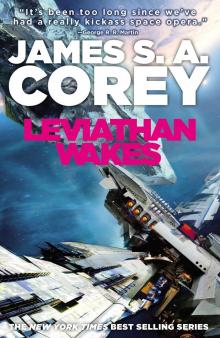 Leviathan Wakes
Leviathan Wakes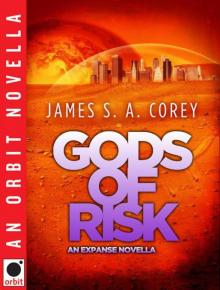 Gods of Risk
Gods of Risk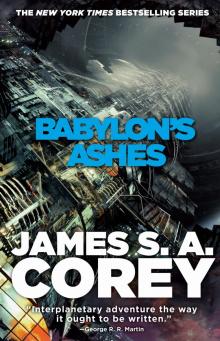 Babylon's Ashes
Babylon's Ashes Expanse 03 - Abaddon’s Gate
Expanse 03 - Abaddon’s Gate Tiamat's Wrath
Tiamat's Wrath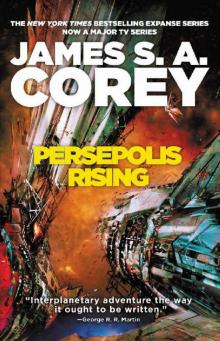 Persepolis Rising
Persepolis Rising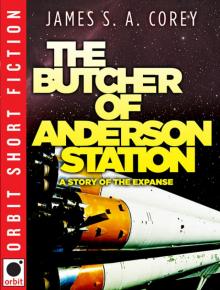 The Butcher of Anderson Station
The Butcher of Anderson Station The Churn
The Churn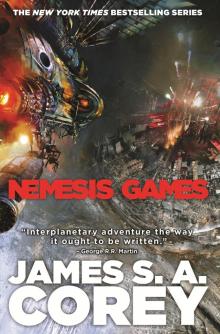 Expanse 05 - Nemesis Games
Expanse 05 - Nemesis Games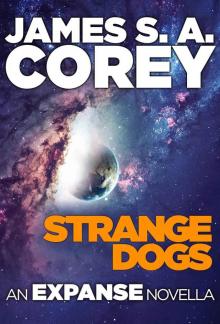 Strange Dogs
Strange Dogs Honor Among Thieves: Star Wars
Honor Among Thieves: Star Wars Cibola Burn
Cibola Burn Caliban's War
Caliban's War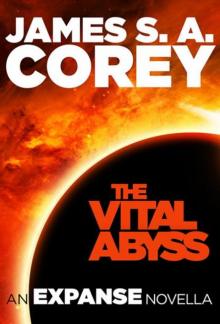 The Vital Abyss
The Vital Abyss Auberon
Auberon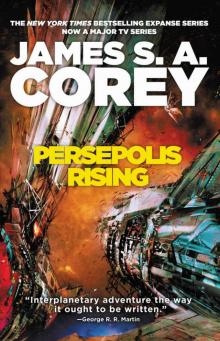 Persepolis Rising (The Expanse)
Persepolis Rising (The Expanse) Caliban's War: Book Two of the Expanse series
Caliban's War: Book Two of the Expanse series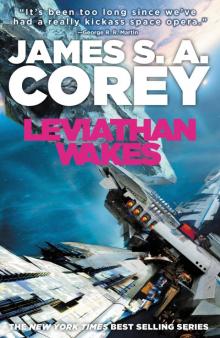 Leviathan Wakes: Book One of The Expanse
Leviathan Wakes: Book One of The Expanse Cibola Burn (Expanse)
Cibola Burn (Expanse)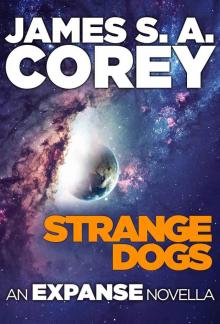 Strange Dogs (Expanse)
Strange Dogs (Expanse)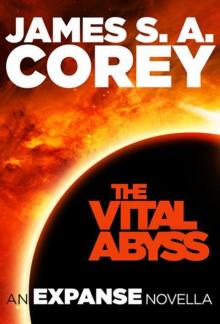 The Vital Abyss: An Expanse Novella (The Expanse)
The Vital Abyss: An Expanse Novella (The Expanse)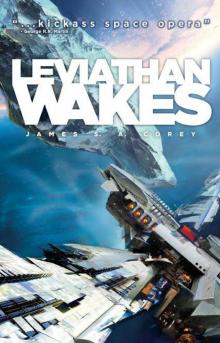 Leviathan Wakes e-1
Leviathan Wakes e-1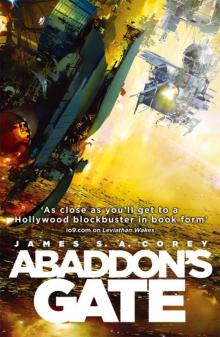 Abaddon's Gate e-3
Abaddon's Gate e-3 Caliban;s war e-2
Caliban;s war e-2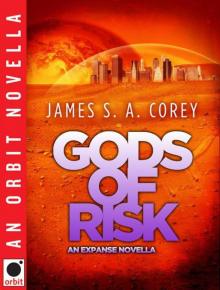 Gods of Risk: An Expanse Novella
Gods of Risk: An Expanse Novella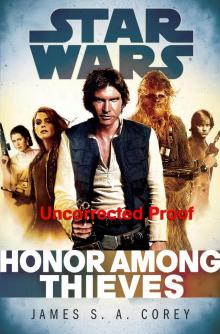 Honor Among Thieves: Star Wars (Empire and Rebellion)
Honor Among Thieves: Star Wars (Empire and Rebellion)